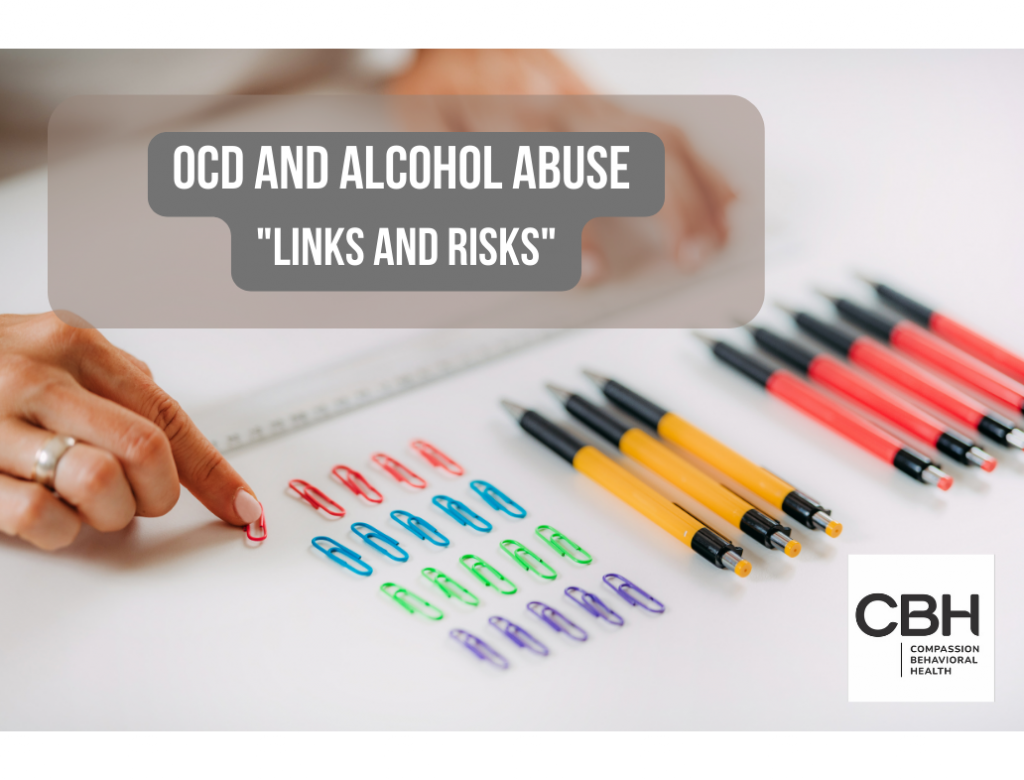Obsessive-compulsive disorder (OCD) and alcohol abuse are two distinct yet interconnected conditions that can significantly impact an individual’s mental and physical well-being. Understanding the link between OCD and alcohol abuse is crucial for effective diagnosis, treatment, and prevention. In this article, we will explore the nature of OCD and alcohol abuse, their connection, the underlying psychological mechanisms, and the available treatment options.
OCD Overview
What is OCD? OCD is a chronic mental health disorder characterized by recurring thoughts (obsessions) and repetitive behaviors (compulsions) that individuals feel compelled to perform to alleviate anxiety or distress. These obsessions and compulsions can vary widely, but they often revolve around themes of cleanliness, orderliness, safety, or harm avoidance.
Obsessive-Compulsive Disorder (OCD) is a complex and multifaceted condition that affects millions of people worldwide. While it can manifest differently in each individual, the core features of OCD remain consistent. Understanding the intricacies of this disorder can help shed light on the experiences of those living with OCD.
Defining OCD
OCD is a recognized psychiatric condition that can profoundly affect an individual’s thoughts, emotions, and behaviors. It goes beyond ordinary worries or everyday routines and significantly interferes with daily life. The Diagnostic and Statistical Manual of Mental Disorders (DSM-5) outlines specific criteria for diagnosing OCD, which typically include the presence of obsessions and compulsions that cause significant distress or impairment.
Obsessions are intrusive and unwanted thoughts, images, or urges that repeatedly enter a person’s mind. These obsessions can be distressing and cause intense anxiety. Compulsions, on the other hand, are repetitive behaviors or mental acts that individuals feel driven to perform in response to their obsessions. These compulsions are often aimed at reducing anxiety or preventing a feared outcome.
It is important to note that not all repetitive behaviors or rituals are indicative of OCD. The key distinction lies in the distress and impairment caused by these obsessions and compulsions. Individuals with OCD often find themselves trapped in a cycle of obsessions and compulsions, which can be time-consuming and interfere with their ability to function in various areas of life.
Common Symptoms and Manifestations

Symptoms of OCD can manifest in various ways, including persistent intrusive thoughts, excessive hand washing, repetitive checking, and ritualistic behaviors. Sufferers often experience distress and a sense of helplessness due to their inability to control or stop these thoughts and actions.
One common manifestation of OCD is contamination obsessions, which involve an intense fear of germs or dirt. Individuals with this obsession may engage in excessive hand washing or cleaning rituals to alleviate their anxiety. These rituals can become so time-consuming and disruptive that they interfere with daily activities and relationships.
Another prevalent obsession in OCD is the fear of harm or danger. Individuals with this obsession may constantly worry about their safety or the safety of their loved ones. This fear can lead to compulsive checking behaviors, such as repeatedly checking that doors are locked or appliances are turned off. While these actions may temporarily alleviate anxiety, the relief is short-lived, and the cycle of obsessions and compulsions continues.

Order and symmetry obsessions are also common in OCD. Individuals with this obsession may feel a strong need for things to be arranged in a specific way or symmetrical. They may spend excessive amounts of time arranging objects or aligning items until they feel a sense of relief. However, this relief is often fleeting, and the obsession resurfaces, leading to further compulsive behaviors.
It is important to recognize that OCD is not simply a quirk or a preference for cleanliness and orderliness. It is a debilitating condition that can significantly impact an individual’s quality of life. Seeking professional help and support is crucial for individuals with OCD to manage their symptoms and regain control over their lives.
The Nature of Alcohol Abuse

Alcohol abuse refers to the excessive consumption of alcohol despite negative consequences on physical health, personal relationships, and overall well-being. Alcohol, a psychoactive substance, can have profound effects on the brain and behavior when consumed in excessive amounts.
Recognizing Alcohol Abuse
Identifying alcohol abuse can be challenging, as it often begins with casual drinking and progressively develops into a harmful pattern. Signs of alcohol abuse may include an inability to control drinking, increased tolerance, neglecting responsibilities, and experiencing withdrawal symptoms when attempting to quit.
The Impact of Alcohol Abuse on Health and Lifestyle
Prolonged alcohol abuse can lead to a range of serious health problems, including liver damage, heart disease, cognitive impairment, and increased risk of accidents. Furthermore, alcohol abuse can strain relationships, disrupt work or academic performance, and contribute to mental health disorders.

Exploring the Connection Between OCD and Alcohol Abuse
Surprisingly, there is a high comorbidity rate between OCD and alcohol abuse. Several factors contribute to this complex relationship, including the role of self-medication and the increased vulnerability of individuals with OCD to alcohol abuse.
The Role of Self-Medication
Individuals with OCD often turn to alcohol as a means of self-medication to temporarily alleviate anxiety or distress associated with their obsessions and compulsions. Alcohol’s sedative properties can provide a momentary relief, leading to a vicious cycle of self-medication and alcohol abuse.
OCD and Increased Vulnerability to Alcohol Abuse
People with OCD may be more susceptible to developing alcohol abuse disorders due to underlying psychological factors. The link between OCD and alcohol abuse can be attributed to shared genetic, neurobiological, and environmental risk factors that increase vulnerability to both conditions.
The Psychological Mechanisms Behind OCD and Alcohol Abuse

The co-occurrence of OCD and alcohol abuse involves intricate psychological mechanisms centered around anxiety, compulsion, and a cyclical pattern of relief-seeking behaviors.
Anxiety, OCD, and Alcohol: A Complex Relationship
Anxiety plays a central role in both OCD and alcohol abuse. While OCD is characterized by excessive anxiety and distress caused by intrusive thoughts, alcohol temporarily reduces anxiety, leading individuals with OCD to utilize alcohol as a coping mechanism. However, this relief is short-lived and often followed by heightened anxiety and intensified obsessions, further perpetuating the cycle.
The Cycle of Compulsion and Relief

Individuals with OCD often experience a compulsive urge to engage in repetitive behaviors or mental rituals to reduce anxiety. Alcohol can temporarily suppress these compulsions, creating a sense of relief. However, this relief reinforces the compulsion-alleviation cycle, making individuals more prone to alcohol abuse as a maladaptive coping strategy.
Treatment Options for Co-Occurring OCD and Alcohol Abuse
Managing co-occurring OCD and alcohol abuse requires a comprehensive approach that addresses both conditions concurrently. Various treatment options have demonstrated efficacy in improving outcomes for individuals struggling with this dual diagnosis.
Cognitive Behavioral Therapy (CBT)

Cognitive Behavioral Therapy (CBT) is a widely used therapeutic approach for treating OCD and alcohol abuse. CBT helps individuals identify and modify negative thought patterns, develop healthier coping strategies, and learn techniques to resist compulsions and alcohol cravings.
Medication and Pharmacological Approaches
Psychopharmacological interventions, such as selective serotonin reuptake inhibitors (SSRIs), are commonly prescribed for individuals with OCD. These medications can help reduce obsessive thoughts and compulsions. For alcohol abuse, medications such as naltrexone and acamprosate may be used to help decrease cravings and promote abstinence.
Lifestyle Changes and Coping Strategies
Implementing healthy lifestyle changes, such as regular exercise, stress management techniques, and social support, can contribute to both OCD and alcohol abuse recovery. Engaging in positive coping strategies, attending support groups, and seeking professional help are also integral parts of the treatment process.
In conclusion, the link between OCD and alcohol abuse is complex and multifaceted. Understanding the nature of OCD, recognizing alcohol abuse, and exploring the psychological mechanisms behind their co-occurrence are crucial steps toward effective diagnosis and treatment. By employing evidence-based approaches, such as CBT, medication, and lifestyle modifications, individuals can overcome the challenges posed by these intertwined conditions and achieve lasting recovery.



